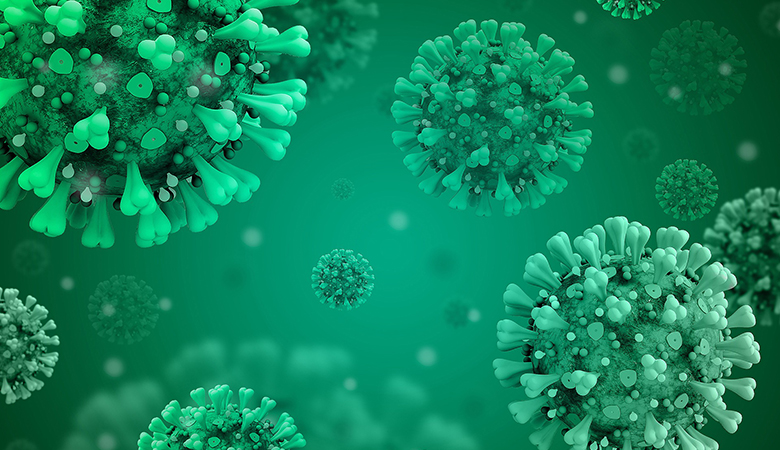University of Illinois College of Medicine Peoria Collaborates on Long COVID Research

The University of Illinois College of Medicine Peoria will collaborate to study causes, prevention and treatment strategies for long COVID in central Illinois. The work is part of a broader collaboration led by University of Illinois Chicago (UIC) researchers that is projected to receive approximately $22 million from the National Institutes of Health over four years to research long COVID, a term used to describe lingering or new symptoms of COVID-19 following recovery from the initial acute phase of the illness.
The funding is part of the NIH’s “Researching COVID to Enhance Recovery” (RECOVER) Initiative. UIC is leading this Illinois-based research consortium called ILLInet RECOVER. The project team involves both Chicago and Peoria researchers who will work with patients, public health departments, health care providers and community-based organizations to study what makes an individual vulnerable to long COVID.
“This collaboration is a great example of how we can leverage the skills and knowledge of UICOMP and UIC communities to bring about a great opportunity for our local community and the central Illinois region. By partnering with affiliate healthcare systems and the Peoria City/County Health Department, we can not only further our understanding of long COVID, but also provide resources and clinical support to patients here in Peoria and surrounding communities,” says Meenakshy Aiyer, MD, regional dean of the University of Illinois College of Medicine Peoria.
This initiative will focus on understanding how to help people infected with SARS-CoV-2, the virus that causes COVID-19, avoid long COVID effects. These effects can include fatigue, shortness of breath, brain fog, sleep disorders, fevers, gastrointestinal symptoms, anxiety, and depression, and their severity can range from mild to completely debilitating.
The ILLInet RECOVER team will explore factors that might be protective and what interventions may be needed to help long COVID patients get back to normal as quickly as possible. Researchers will focus on understanding long COVID in adults and its impact on vulnerable communities in both urban and rural areas.
A co-principal investigator of the ILLInet RECOVER initiative who will be leading the Peoria effort is Sarah Stewart de Ramirez, MD. Dr. de Ramirez is associate dean for population health equity innovation and associate professor of emergency medicine and director of equity innovation medicine at UICOMP as well as medical director of population health at OSF HealthCare.
“Bringing the ILLInet RECOVER initiative to the greater Peoria community and this collaboration with the Peoria City/County Health Department, both healthcare systems, and our not-for-profit social care partners is an incredible opportunity. It will allow our community of patients, especially those historically under-represented in research but immensely impacted by COVID, to contribute to the collective understanding of long COVID. Peoria will be a part of the discovery and recovery story of COVID, helping to identify future treatments and ensuring equitable access to the fruits of that scientific labor,” says Stewart de Ramirez.
Through community outreach and in partnership with community-based organizations, the ILLInet RECOVER researchers hope to enroll, conduct baseline health assessments, and follow 1,000 Illinoisans age 18 and up from Chicago, Peoria and surrounding communities.
UICOMP Director of Research Services, and an investigator on the study, Sarah Donohue, PhD, says, “This study is a great example of how the College of Medicine can collaborate locally, statewide, and nationally to solve important problems and contribute to a scientific body of work on what is one of the most pressing health issues of modern-day life.”
Locally, OSF HealthCare Saint Francis Medical Center in Peoria will serve as a recruitment and testing site for the study, and UnityPoint Health will also serve as a testing site. The Peoria City/County Health Department will be a key collaborator in identifying and providing outreach to patient participants. Additional recruitment of patients will occur with help from the community-based organizations of Central Illinois Friends and Peoria Friendship House, and the Tri-County Urban League will also be participating in study-related community engagement activities.
Monica Hendrickson, MPH, administrator Peoria City/County Health Department, says, "For over 24 months, Peoria City/County Health Department has been at ground-zero in seeing the impacts of COVID-19 in our community. This collaboration allows the knowledge gained by the public health system, the skills of our healthcare systems, and the expertise of UICOMP in learning more about the virus and how it will impact our community’s health is the future."
Study participants will fill out a survey about their health, get a brief physical exam, and have some lab tests every three to six months for a period of two years. Test results will be shared with the participant, and if requested, with their health care providers.
The NIH funding for ILLInet RECOVER is provided by other transaction authority, or OTA (OT2HL16184701). According to the NIH, other transactions, or OTs, allow for much greater speed, flexibility, and accessibility in performing research and prototyping activities than standard procurement contracts, grants, or cooperative agreements.
How to Take Part in ILLInet RECOVER Long COVID Research
Anyone interested in taking part in long COVID research can contact info@illinet.org or CALL (309) 233-0299. Visit illinet.org for more information.